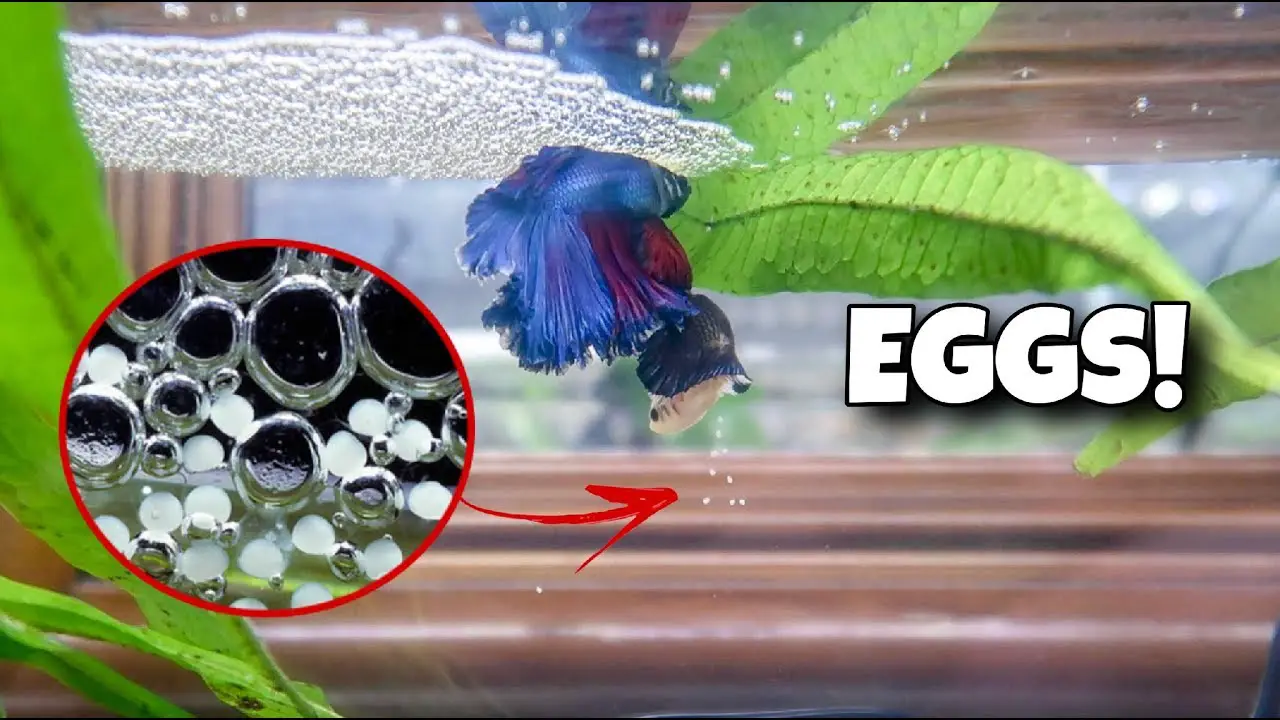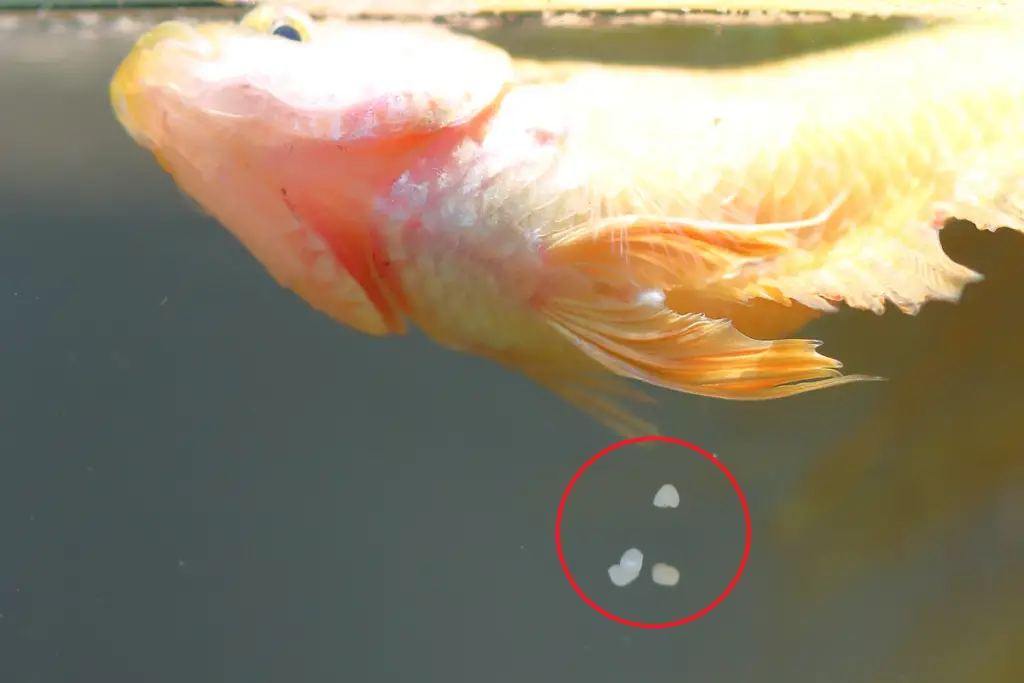Betta fish are known for their vibrant colors and long, flowing fins, making them a popular choice for aquarium enthusiasts. However, there are still many misconceptions surrounding these beautiful fish, including whether or not male betta fish lay eggs.
Contrary to popular belief, male betta fish do not lay eggs. In fact, it is the female betta fish who are responsible for laying eggs during the breeding process. In this article, we will explore the differences between male and female betta fish and the process of breeding these fascinating creatures.

Do Male Betta Fish Lay Eggs?
Betta fish, also known as Siamese fighting fish, are a popular choice for aquarium enthusiasts due to their vibrant colors and unique personalities. One of the most intriguing aspects of betta fish is their breeding behavior, which involves the male and female fish engaging in an intricate dance before laying eggs. But do male betta fish lay eggs? Let’s explore this question in more detail.
Male Betta Fish and Egg Laying
Male betta fish do not lay eggs. Instead, it is the female betta fish that lays eggs. During the breeding process, the male betta fish will fertilize the eggs as they are released by the female. The eggs are then carefully guarded and tended to by both parents.
There are a few things to keep in mind if you are interested in breeding betta fish. First, it is important to have a separate breeding tank set up. This tank should be at least 10 gallons in size and should have a heater and filter. Additionally, you should provide plenty of hiding spots for the female betta fish to lay her eggs.
When breeding betta fish, it is also important to carefully monitor the water quality and temperature. Betta fish prefer water that is slightly acidic and around 80 degrees Fahrenheit. You may need to adjust the pH and temperature of the water in your breeding tank to ensure the best possible conditions for your fish.
Male Betta Fish and Female Selection
When selecting a female betta fish for breeding, there are a few things to keep in mind. You should choose a healthy and active female that is at least six months old. Additionally, you should look for a female that has a round, full belly, which indicates that she is ready to lay eggs.
It is also important to choose a female betta fish that has a compatible personality with the male. If the male and female betta fish do not get along, they may become aggressive towards each other and may even harm each other or the eggs.
Benefits of Breeding Betta Fish
Breeding betta fish can be a rewarding experience for aquarium enthusiasts. Not only does it allow you to witness the intricate breeding process of these fascinating fish, but it also allows you to potentially produce offspring with unique and desirable traits.
Additionally, breeding betta fish can help to preserve the genetic diversity of the species. Many betta fish in pet stores are bred in mass quantities and may have genetic defects or health issues. By breeding your own betta fish, you can help to prevent inbreeding and ensure the health and vitality of the species.
Male vs. Female Betta Fish
While male and female betta fish share many similarities, there are a few key differences to keep in mind. Male betta fish tend to be more colorful and have longer fins than females. They also tend to be more aggressive and territorial, which is why it is important to introduce them to a breeding tank slowly and carefully.
Female betta fish, on the other hand, tend to be smaller and have shorter fins. They are also generally less aggressive than males, although they may still exhibit territorial behavior during the breeding process.
Conclusion
In conclusion, male betta fish do not lay eggs. Instead, it is the female betta fish that lays eggs during the breeding process. Breeding betta fish can be a rewarding experience, but it is important to carefully monitor water quality, temperature, and the compatibility of the male and female fish. By following these tips, you can help to ensure the health and vitality of your betta fish and potentially produce offspring with unique and desirable traits.
Freequently Asked Questions
Do Male Betta Fish Lay Eggs?
Male Betta fish do not lay eggs. It is the female Betta fish who lay eggs. However, male Betta fish do play an important role in the breeding process. Male Betta fish build bubble nests where the female can lay her eggs and the male will then fertilize them.
The male Betta fish will also guard the eggs and the fry (baby fish) once they hatch. This is why it is important to have a separate breeding tank for Betta fish and to remove the male once the fry have hatched to prevent him from attacking them.
How Do You Tell the Gender of a Betta Fish?
The easiest way to tell the gender of a Betta fish is by looking at their fins. Male Betta fish have longer, flowing fins than females. They also have brighter colors and larger bodies than females. Females, on the other hand, have shorter fins and are less colorful than males.
Another way to tell the gender of a Betta fish is by looking at their behavior. Male Betta fish are more aggressive than females and will often flare their fins and display their colors to other fish. Females, on the other hand, are more docile and tend to hide more often.
How Often Do Betta Fish Lay Eggs?
Betta fish can lay eggs every two to three weeks if they are well-fed and healthy. However, it is not recommended to breed Betta fish too often as it can be stressful for the female and can also lead to health problems for both the male and female.
If you do decide to breed Betta fish, it is important to give them a break between breeding cycles to allow them to recover and regain their strength.
How Many Eggs Do Betta Fish Lay?
Betta fish can lay anywhere from 10 to 1000 eggs depending on the size and age of the female. Younger females will produce fewer eggs than older females. The male Betta fish will then fertilize the eggs by releasing sperm over them.
It is important to remove the male Betta fish from the breeding tank once the eggs have hatched to prevent him from attacking the fry.
How Long Does It Take for Betta Fish Eggs to Hatch?
It takes approximately 24 to 36 hours for Betta fish eggs to hatch. Once the eggs have hatched, the fry will stay in the bubble nest for an additional two to three days before becoming free-swimming.
It is important to feed the fry small amounts of food several times a day once they become free-swimming to ensure their survival. It is also important to maintain clean water in the breeding tank to prevent the fry from getting sick.

Breeding Betta Fish | My betta ate the eggs 😮
In conclusion, male betta fish do not lay eggs. It is the female betta fish that lay eggs during the breeding process. However, male betta fish still play an important role in fertilizing the eggs and protecting the nest.
Despite not laying eggs, male betta fish are fascinating creatures to observe and care for. They are known for their vibrant colors, long flowing fins, and unique personalities. With proper care and attention, male betta fish can live for several years in captivity.
If you are interested in keeping betta fish as pets, it is important to understand their behaviors and needs. Investing in a suitable tank and providing a balanced diet are crucial for their well-being. By providing a healthy and stimulating environment, you can enjoy the beauty and company of these amazing fish for years to come.
